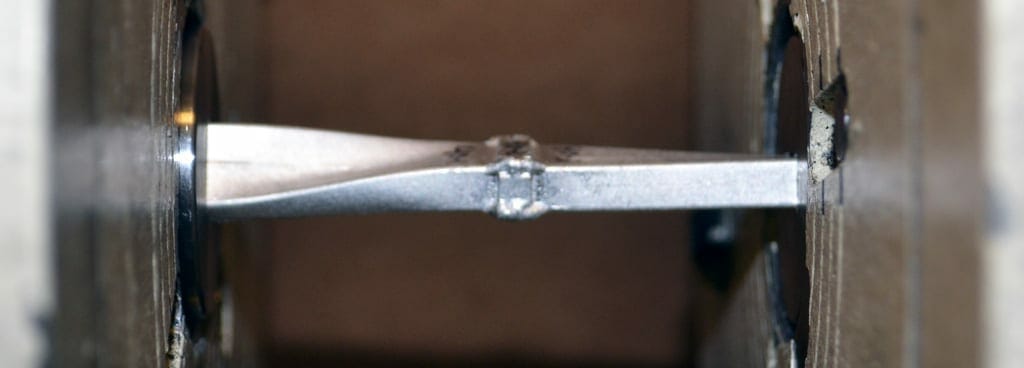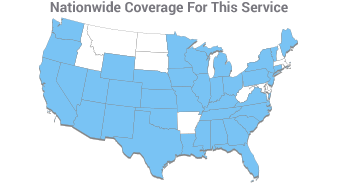- Home
- Services/IndustriesServicesindustries
- About Us
- LocationsStatesAccordion ContentAccordion ContentAccordion ContentAccordion Content
- Job Openings
- Quick Links
- ATS Family

Torque Testing
Applied Technical Services possesses a broad range of mechanical testing capabilities, one of which is called torque testing. Occasionally referred to as torsion testing, torque testing is used to determine performance characteristics of a sample component for either material qualification or failure analysis purposes.
The association between tension and torque should be considered carefully, since it is quite hard to specify the variation of conditions of a fastener. The amount of the twisting force necessary to rotate the nut along the bolt threads is known as torque, however tension is the elongation or elasticity of a fastener that provides the holding force of a joint.
Fasteners are intended to stretch or give slightly, and the clamping load that develops during this elastic elongation is what makes the joints lock together. Torque is an incidental indication of tension, as many factors can disturb this association, such as texture of the mating surfaces, oils, rubbish, thread series, rust and material type, for instance. Almost all tables about the torque/tension relationship that have been established, including ours, are based on the following formula:
T = (K D P)/12
The proper torque value to use in a particular application is best achieved by utilizing a torque wrench previously calibrated and a load indicating Skidmore-Wilhelm device to associate the verified torque to the ideal tension.
What is proof load? How is proof load distinguished from ultimate and yield strength?
All of the following terms refer to the mechanical properties that aid to define the anticipated tensile strength performance of a precise fastener and can be calculated in units of force. The force is typically reported in Newtons (N) and/or pound-force (lbf). Sometimes these forces are reported in kilonewton (kN) and kilopound-force (kip). The difference is that one is used for standard measurements (inches) and the other is mostly used for metric measurements (mm).
Applying sufficient tensile force to a fastener where the outcome will not show plastic deformation is known as proof load. Proof load is considered to be around 85% – 95% of the yield strength. That is to say, the fastener must stay in its elastic range when force is applied up to its proof load. We can define Yield Strength as the tensile force that will produce permanent distortion (most commonly at 0.2% plastic strain) on a specified fastener. The maximum force a fastener must tolerate before fracture is defined as Ultimate Tensile Strength.
Frequently Tested Materials and Products
Popular Test Standard
Standard Test Methods and Definitions for Mechanical Testing of Steel Products — ASTM A370

Request Form
"*" indicates required fields
Mechanical Testing
- Accredited ASTM Lab
- ATSM Brinell Hardness Testing
- ASTM D1002
- ASTM E23 Charpy Impact Test
- ATSM Testing Lab
- ATSM Testing Services
- ASTM F519 Embrittlement Testing Services
- Bend Testing
- Bolt Tension Testing
- Charpy Impact Testing
- Charpy V Notch Testing
- CTOD Testing
- Drop Weight Testing
- Dynamic Tensile Testing
- Elevated Temperature Testing
- Hardness Testing
- High Speed Tensile Testing
- High Temperature Mechanical Testing
- High Temperature Tensile Testing
- Hot Tensile Testing
- Hydrogen Embrittlement Testing
- ISO 6892 Tensile Testing
- Izod Impact Testing
- Lap Shear Testing
- Load Testing
- Load Performance Testing
- Materials Lab Testing Services
- Materials Testing Company
- Mechanical Testing
- Mechanical Testing Certifications
- Mechanical Testing Lab
- Mechanical Testing Services
- Micro Tensile Testing
- Notched Weld Testing
- Plane Strain Fracture Toughness Testing
- Shear Strength Testing
- Shear Testing
- Strain Gauge Testing
- Tensile Coupon Testing
- Tensile Strength Testing
- Tensile Strength Testing Laboratory
- Tensile Testing
- Tensile Testing Lab
- Tensile Testing Metallurgical Lab
- Torque Testing
- Weld Procedure Qualifications
- Weld Testing
- Weld Testing Services
- WPS Qualified Welding Procedure
